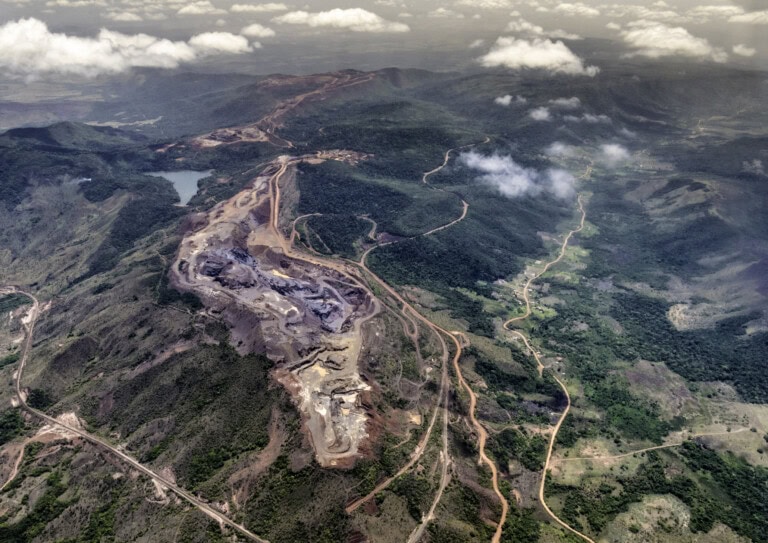Collaborating to build beyond net zero

Earlier this month, and six months into my new role as Director of Membership at UKGBC, I hosted our member-exclusive Building Beyond event. Standing in the Barbican in front of over 70 UKGBC members and staff, I was more nervous than I expected to be. Perhaps because my boss, our CEO, Julie Hirogoyen and our incoming CEO, Smith Mordak, were in attendance. Or perhaps it was because the brightest industry minds from our membership were gathered in the room, ready to discuss the most pressing issues and opportunities facing the industry.
I need not have been nervous. This year’s theme was a dive deep into the ideas that go beyond net zero and take a step closer towards regenerative design and nature recovery and we had two brilliant projects that inspired lively discussions throughout the room. Mina Hasman, Sustainability Director and Climate Advocacy Lead at SOM presented Urban Sequoia, a regenerative design concept and Jenny Ross, Associate Ecologist at Buro Happold presented Mayfield Park, Manchester’s first new public park in over a century which has sustainable ecology at its core.
What is regenerative design?
Regenerative design is a topic that is rapidly gaining traction as leading voices throughout the industry suggest it’s the only viable route to meet our climate and nature targets. It is an approach that seeks to go beyond ‘sustainable design’ by enabling human and natural systems to repair, adapt and evolve to maintain a healthy state. It applies holistic and systemic thinking, focused on creating net positive outcomes across a broad range of topics. Regenerative design does not just consider a building in isolation, it also looks at how it is beneficial to and interconnected with surrounding (eco)systems. Elements of regenerative design we might see on projects now include ‘triple net zero’ approaches (energy, water, waste), use of materials that sequester carbon and pollutants, and the promotion of biodiversity, wellness and social equity within surrounding communities. With the term increasingly mainstreaming, we brought the topic to the tables for our members to discuss the challenges and opportunities regenerative design presents.
Drawing from Mina and Jenny’s thought-provoking case studies, members exchanged ideas on how the industry can drive forward regenerative building and challenge the prevailing mindsets to enable this paradigm shift. The discussions brought together diverse perspectives from members representing the breadth of the built environment chain, all with varied backgrounds and expertise but who share a strong commitment to achieving radically sustainable outcomes. The event’s informal and collaborative spirit provided a real opportunity for our members to hear fresh perspectives, case studies and first-hand thought leadership from those in the industry already delivering change.
The power of collaboration
We all work collaboratively, this isn’t something new, but the discussions at Building Beyond did remind me how much faster we can go in addressing the climate and nature crisis if we did much more of it, and even go further to put aside competition and “open source” our ideas and solutions.
At Future Build last week, I heard about a great project, where sharing commercially sensitive data, processes and innovations and genuinely working in collaboration, has offered all the partners huge gains. The Retrofit Accelerator for Homes Innovation Partnership is a very interesting case study in private and public sector cooperation. By sharing our ideas and inviting others to contribute, we can help build a more inclusive, transparent, and sustainable future. Open sourcing our ideas can accelerate innovative and effective solutions, promote transparency and accountability and lead to more rigorous and robust ideas. Might open sourcing more of our ideas help tackle the climate and nature crisis at the speed and scale required?
UKGBC member opportunities
We’ve seen at UKGBC’s Collaboration Café events just how open our members are to sharing ideas, solutions and insights that will help us collectively address the challenges we face as an industry. This year at UKGBC we’re building on the momentum and success of COP15, where nature had its ‘Paris moment’, and collaborating with our network to deliver more progress through our Resilience and Nature programme, including a new series of Collaboration Cafés under this theme.
We’re committed to supporting our members to have more ambition in this space, and for this to convert into tangible and measurable action to make our buildings, communities, towns, cities and infrastructure more climate-resilient and nature positive. To do this, we know it’s vital that all levels of built environment professionals are empowered, and our extensive range of leadership, learning and development opportunities empowers individuals to drive this change within their organisations.
If you would like to find out more about how UKGBC can power the acceleration of your sustainability journey, then please get in touch.
To see the power of open collaboration in practice, join one of our Spring Social and Net Zero Carbon Buildings Solutions Forum events, both hosted across our local area networks exclusively for UKGBC members. The new series of Collaboration Cafés will open for registration soon, watch this space.
Related
Navigating the challenges around hard-to-recycle materials

What are the environmental impacts of construction materials? An introduction to Embodied Ecological Impacts

Why is social value so crucial when developing and managing commercial real estate?

Biodiversity Net Gain: Are you ready for the incoming legislation?

